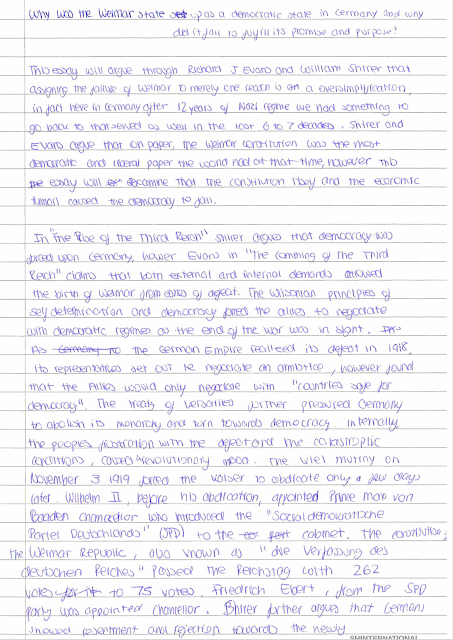From the May 2010 Paper 2 IBDP History Paper 2 exam
From the markscheme
The first part of the question suggests that candidates should consider the reasons for the establishment of the Weimar republic and why it was set up as a democracy. On 9 November 1918, a republic was proclaimed in Berlin and after elections in January 1919 a National Assembly met in Weimar in January 1919 to write a constitution. The reasons for the setting up of the democratic state included Germany’s defeat in the First World War and the abdication of the Emperor William II. When it requested an armistice one of the conditions imposed on Germany was that it introduce a democratic process. Its failure will probably be based on three main areas: the weaknesses of the Weimar Constitution; its connection with the treaty of Versailles; the economic crisis of 1929 and subsequent reliance on Presidential government; the appointment of Hitler as Chancellor.
Example from an excellent former student written under exam conditions:
Typed example:
The Weimar Republic, established in Germany post-World War I, represented an attempt to introduce democratic governance within a nation familiar with autocratic rule. This new political structure, seen as a beacon of hope and modernisation, emerged as a response to the Treaty of Versailles' mandate and the German populace's growing dissatisfaction with the Kaiserreich. However, despite its promising outset, the Weimar Republic struggled to fulfil its initial promise, ultimately capitulating to the fascist governance of Adolf Hitler and the Nazi Party by 1933. This essay will explore the reasons behind the inception of the Weimar state as a democratic entity and discuss the critical factors that precipitated its downfall.
Post-World War I, Germany found itself in political, economic, and social turmoil. The end of the war had left the German Kaiser, Wilhelm II, devoid of public support, resulting in his abdication. The power vacuum that ensued necessitated the creation of a new government, leading to the birth of the Weimar Republic in 1919. As historian Richard J. Evans posits, this birth was less by design and more an act of desperation amidst chaos. The Treaty of Versailles, which ended the war, stipulated the establishment of a democratic regime, causing Germany to adopt this form of government, perhaps without a deeply-rooted conviction in its principles. Simultaneously, an internal push for democracy came from progressive factions within Germany who viewed it as a modern, enlightened system of governance, a stark contrast to the autocratic rule they had known. This idea was echoed by historian Detlev Peukert, who argued that despite its eventual failure, the Weimar Republic embodied the spirit of modernism and symbolised a new beginning for Germany.
Unfortunately, the Weimar Republic was dogged by significant political instability from its inception. A crucial weakness lay in its constitution. Historian Eberhard Kolb suggests that the constitution's inclusion of proportional representation led to a highly fragmented Reichstag, making stable government coalitions nearly impossible. This issue was compounded by Article 48, which allowed the President to rule by decree in emergencies, undermining parliamentary power. Moreover, political extremism grew, from both the left-wing Spartacist group and the right-wing Kapp Putsch. These groups exploited the Republic's perceived weakness, sowing discord and violence, thereby eroding the public's faith in their government.
The economic issues that the Weimar Republic grappled with also proved critical in its downfall. The harsh reparations imposed by the Treaty of Versailles left Germany with insurmountable debt. Hyperinflation rocked the economy in the early 1920s, leaving the German mark virtually worthless. According to historian Harold James, the severe economic strain undermined the Republic's credibility and bolstered support for extremist political factions. While the Dawes Plan of 1924 briefly stabilised the German economy, the onset of the Great Depression in 1929 proved catastrophic. Mass unemployment and economic despair turned the public against the Republic, resulting in increasing support for the promises of Hitler and his Nazi Party.
The Weimar Republic, despite its democratic ethos, faced tremendous social and cultural resistance. Many Germans, including the old elites in the military and judiciary, remained wedded to autocratic values, harbouring a latent 'authoritarian impulse,' as historian Eric Weitz has argued. This resistance manifested in the consistent undermining of the Weimar state from within. Further, the stigma of the 'November Criminals' and the perceived 'stab-in-the-back' by the Weimar politicians who signed the Treaty of Versailles made the Republic a target of national resentment. The cultural avant-garde, although vibrant and innovative, also alienated a significant section of society who found its values at odds with traditional norms.
The Weimar Republic's inception as a democratic state in Germany was largely circumstantial, a response to external pressures from the Treaty of Versailles and internal pressures from a war-weary and disillusioned populace. Despite its promising beginnings and the spirit of modernity it embodied, the Republic was undermined by political instability, economic crises, and deep-seated cultural resistance. These elements, assessed critically, offer a comprehensive understanding of the Weimar state's failure. While democracy promised a fresh start for Germany post-World War I, the particular conditions of Weimar's birth and development were overwhelmingly stacked against its survival. Thus, the Republic serves as a poignant historical lesson on the fragilities of nascent democracies within politically volatile and economically strained societies.





